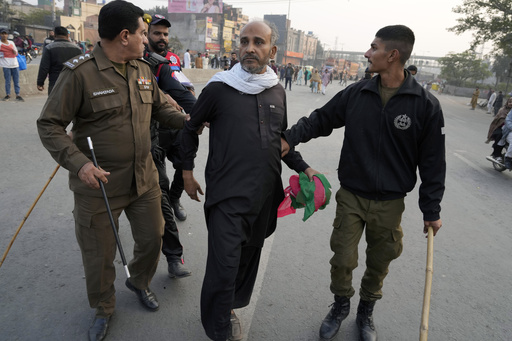
Khan, who has been incarcerated for more than a year and contends with over 150 criminal charges, still holds significant popularity among the public. His political faction, Pakistan Tehreek-e-Insaf (PTI), alleges that these charges are driven by political motives.
This protest, termed a “long march,” coincides with an upcoming visit by Belarusian President Alexander Lukashenko to Islamabad.
The convoy carrying demonstrators is anticipated to arrive in the capital later on Monday, which has been heavily secured. Authorities predict attendance figures to range between 9,000 and 11,000 participants, while the PTI insists that the actual number will be substantially larger.
The lockdown, implemented two days prior to the protest call, has significantly interrupted normal life, with travel restrictions making movement between Islamabad and other regions nearly untenable. Ambulances and vehicles were seen reversing from areas along the vital Grand Trunk Road in Punjab, where shipping containers have been strategically placed to block access.
Video footage surfacing online displayed some protesters, who had traveled all night, operating heavy machinery to dismantle the obstacles blocking the roads to Islamabad.
“We are resolute and will reach Islamabad, even though the police are deploying tear gas to halt our approach,” Kamran Bangash, a senior PTI leader, stated. “We will overcome all barriers one by one, and our supporters are removing the containers from the roads.”
Bangash also mentioned that Khan’s spouse, Bushra Bibi, who was recently granted bail in a corruption case, would be leading the march along with Ali Amin Gandapur, the chief minister of Khyber Pakhtunkhwa province, where Khan’s party continues to hold power.
About 50 kilometers (31 miles) from Islamabad, Bibi, dressed in a loose Hijab and a complete white burqa, addressed attendees from the top of a truck, urging them to remain steadfast in their pursuit of “achieving their objective” and securing Khan’s freedom. She then chanted, “God is great,” before departing the scene.
Khan’s primary political rival, Prime Minister Shehbaz Sharif, currently leads the government.
Sharif’s spokesperson, Attaullah Tarar, mentioned on Sunday that the PTI tends to initiate “the politics of long marches” when significant foreign delegations visit Pakistan, claiming it adversely affects the economy.
Reports from some economists indicate that such protests can lead to billions of rupees in damage to the country’s already delicate economic structure.
The scene escalated on Sunday night with demonstrators setting fire to trees as police retaliated with tear gas to disperse the crowd. Khan’s supporters countered by using slingshots and throwing rocks at law enforcement.
To impede the protest, authorities have detained over 4,000 of Khan’s supporters since Friday and have suspended mobile and internet services in “security-sensitive areas,” which the PTI claims hampered their protest mobilization efforts on social media. On Thursday, a court imposed a ban on rallies in the capital and Interior Minister Mohsin Naqvi warned that anyone defying the order would face arrest.
Officials assert that only the courts have the authority to dictate Khan’s release. He was removed from office in 2022 following a no-confidence motion in Parliament and has been imprisoned since his initial conviction in a corruption case.
Khan has faced multiple sentences, including three, ten, fourteen, and seven years to be served concurrently, according to Pakistani law. Although his convictions were annulled on appeal, he remains unable to secure his release due to other unresolved cases pending against him.
